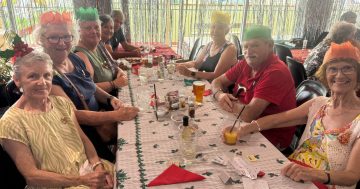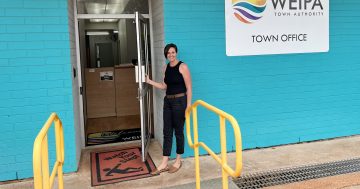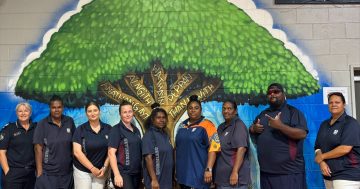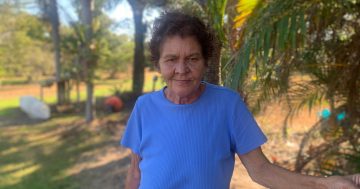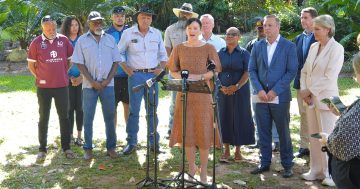
Christmas can be a difficult time for people living with dementia. Photo: @wavebreakmedia, Envato.
As families spend more time together over the festive season, it can reveal early signs of dementia in loved ones or exacerbate challenges for those already living with a diagnosis.
Dementia Australia CEO and Illawarra resident Professor Tanya Buchanan encourages families to seek support if needed, with a National Dementia Helpline available even on Christmas Day to assist those facing new or ongoing dementia-related concerns.
Tanya said the need for support could increase over the festive period as family gatherings and changes to routines caused additional challenges for people living with dementia, their carers and loved ones at a time when many services reduced their hours or closed.
“What we know is that people will contact us mostly after Christmas, when they have been spending time with their family and loved ones and have some concerns about things that have happened over the Christmas period,” Tanya said.
However, she said as Dementia Australia launched its Christmas appeal to help support its services, she wanted to remind people they didn’t have to wait until after the holiday period, with the National Dementia Helpline operating 24 hours a day – even on Christmas Day.
“As the number of Australians impacted by dementia continues to grow, it is more important than ever to ensure all Australians have timely and easy access to dementia supports and services, especially over the festive season,” she said.
Tanya said dementia could develop at any age, with the illness not a normal part of ageing.
“Dementia can affect Australians in all of the decades of their life, and we have a significant number of people in Australia who live with dementia who are under the age of 65,” she said.
“If you have concerns about people’s cognition or their behaviour in those family environments that you think might have changed, it really is important to think about how you can help that person and support them.”
One of the things to look for around dementia was memory loss, particularly names, numbers or ways people did their job.
“It is normal to forget things from time to time,” Tanya said.
“The thing we’re looking for is if it’s happening more frequently, or you’re forgetting things that you used to remember really easily.”
She said other first signs could include having trouble doing familiar tasks or getting lost in the sequencing of familiar tasks, like housework.
“That can be normal for all of us if you forget to do something just for a moment, but it’s if it’s happening more often or it’s getting worse,” she said.
“That might be things like you notice someone’s having trouble preparing a meal that you’ve seen them do a million times before.”
Tanya said another sign was changes in personality or behaviour.
“We know Christmas can be a challenging time for all of us and a tiring time, and that can also exacerbate the challenges for someone who is living with dementia,” she said.
“It’s things like, if people are having sudden mood swings, if they’re going from being calm to angry for no apparent reason. If they’re unusually confused or withdrawn, or they start acting less inhibited or more familiar with people than they have in the past.”
Tanya said for those who already had a dementia diagnosis, it was important to ask what they would like at Christmas time.
“It’s really around understanding the individual and what their needs are and working with them,” she said.
“If you are having a big gathering with a family member or a loved one who is living with dementia, it’s important to think about the impact that has on them.”
Tanya said anyone could contact the National Dementia Helpline for advice and support on how to structure Christmas and family festivities to make it a more enjoyable experience for a loved one living with dementia.
She said with each experience slightly different, it was important to speak to a GP and encouraged people to use Dementia Australia’s free BrainTrack app, which helps monitor and understand changes in cognition over time.
Tanya said Illawarra residents were fortunate to be living in a region that was working towards creating dementia-friendly communities.
“People living with dementia tell us that when they get that diagnosis, they really experience a lot of stigma and discrimination because people don’t understand what it means,” she said.
‘There’s this automatic assumption that they have lost capacity, but that’s not true.
“People can have a dementia diagnosis and live quite well with dementia for many, many years.”
She said having dementia-friendly communities meant people living with the progressive neurodegenerative disorder could have access to the same services and support as others.
“We are quite lucky in the Illawarra and we’ve got some really great examples.
“In fact, it was the 10-year anniversary of the Dementia Inclusive Kiama Project, and that project is a great example of how we can have inclusive communities that support people to live well with dementia, and which can help communities to understand and be aware of what dementia means and how we can live with it.”
Donate to the Christmas appeal, or if you need help, contact Dementia Australia on 1800 100 500.
Original Article published by Kellie O’Brien on Region Illawarra.



